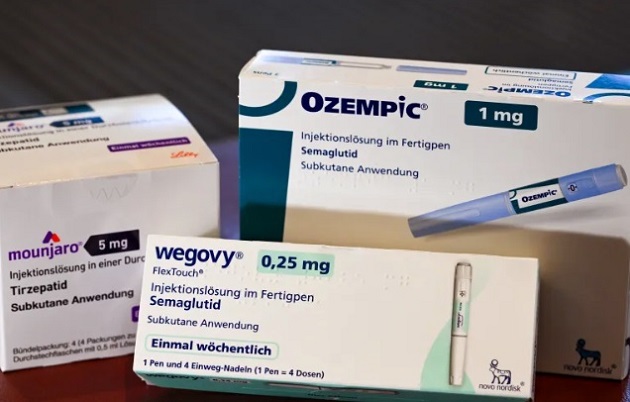Study Shockingly Finds That GLP-1 Drugs Used for Diabetes or Weight Loss Increases Risk of Macular Degeneration!
Nikhil Prasad Fact checked by:Thailand Medical News Team Jun 07, 2025 8 months, 1 week, 5 days, 13 hours, 31 minutes ago
Medical News: A Growing Concern Over Popular GLP-1 Drugs such as Wegovy and Ozempic
Drugs like Ozempic, Wegovy, and other GLP-1 receptor agonists (GLP-1 RAs) have become household names, hailed for their effectiveness in managing type 2 diabetes and promoting weight loss. However, new research now raises serious concerns about a potential hidden danger: these drugs may significantly increase the risk of a serious eye condition called neovascular age-related macular degeneration (nAMD), which can lead to irreversible blindness.
 Study Shockingly Finds That GLP-1 Drugs Used for Diabetes or Weight Loss Increases Risk of Macular Degeneration
Study Shockingly Finds That GLP-1 Drugs Used for Diabetes or Weight Loss Increases Risk of Macular Degeneration
This
Medical News report highlights a major new study conducted by researchers from the Department of Ophthalmology and Vision Sciences at the University of Toronto, St. Michael’s Hospital (Unity Health Toronto), and the Temerty Faculty of Medicine. Their findings, published in JAMA Ophthalmology, point to a strong association between the use of GLP-1 drugs and a two-fold increase in the risk of developing nAMD.
Understanding Macular Degeneration
Macular degeneration is the leading cause of permanent vision loss in people over 65. The neovascular or “wet” form is particularly severe. It occurs when abnormal blood vessels grow under the retina and macula, leaking fluid and blood, causing rapid damage to the retina and significant vision impairment. Early treatment with injections can help, but many still suffer major vision loss.
The Study and Its Scope
In this large, population-based retrospective cohort study conducted in Ontario, Canada, researchers examined health records from over 1.1 million patients aged 66 and older with type 2 diabetes. They created a matched study group of 139,002 patients: 46,334 who were prescribed GLP-1 drugs for more than six months, and 92,668 who were not exposed to these drugs.
The main question was: does taking GLP-1 RAs increase the risk of developing neovascular age-related macular degeneration? The answer appears to be yes.
Startling Results
The incidence of nAMD in the exposed group was 0.2%, compared to 0.1% in the unexposed group. While that difference may seem small, it represents a doubling of risk. The hazard ratio (HR) for developing nAMD was 2.21 (95% CI, 1.65-2.96) after adjusting for various demographic and medical factors. Longer duration of GLP-1 RA use correlated with a higher risk, with patients on the drugs for more than 30 months showing a more than threefold risk increase.
Mechanism Still Unclear
Researchers suggest that rapid reductions in blood sugar caused by GLP-1 RAs may create a temporary hypoxic state in the retina, which then triggers abnormal blood vessel growth. Additionally, these drugs might increase levels of a molecule called CXCL12, which promotes angiogenesis (the formation of new blood vessels) and is also involved in retinal damage.
/>
Conflicting Data and Caution
This isn’t the first time GLP-1 RAs have been linked to eye issues. Previous clinical trials like SUSTAIN-6 and PIONEER-6 also found an increase in diabetic retinopathy complications. However, other studies and animal trials have suggested these drugs might protect against eye damage.
Given these contradictions, researchers stress that their findings only show an association, not direct causation. Still, the implications are concerning enough that physicians and patients should be made aware of the potential risk.
What This Means for Patients
Millions of people now use GLP-1 drugs, not just for diabetes but for obesity management as well. With usage rates skyrocketing, even a small increase in eye disease risk could have a major public health impact.
Patients who are on GLP-1 medications should not panic, but they should be aware of any new visual symptoms such as blurry vision, difficulty reading, or distorted sight. Prompt eye exams can help detect early changes. Healthcare providers might consider regular eye screenings for patients on long-term GLP-1 therapy.
Limitations of the Study
The study relied on healthcare databases and billing records, which means it couldn’t account for all possible risk factors like smoking, sun exposure, or exact dosing. Also, the researchers didn’t break down the risks for individual GLP-1 brands. Nonetheless, the large sample size and careful matching methods lend strong credibility to the findings.
Conclusions and Warnings
The study adds to growing concerns about the ocular safety of GLP-1 receptor agonists. It found a clear and statistically significant association between the use of these popular drugs and the development of a sight-threatening eye condition. While the overall risk remains low, the doubling of risk and stronger effects with prolonged use raise red flags.
Healthcare professionals should weigh the benefits of these medications against their potential risks, especially in older patients or those already at risk for eye diseases. It may also be time for pharmaceutical companies to investigate the underlying biological mechanisms further and consider long-term ocular safety testing.
Patients should never stop or alter their medications without consulting their doctors, but they should be informed and encouraged to seek regular ophthalmological evaluations.
The study findings were published in the peer reviewed journal: JAMA Ophthalmology.
https://jamanetwork.com/journals/jamaophthalmology/fullarticle/2834964
For the latest on Wegovy or Ozempic, keep on logging to Thailand Medical News.
Read Also:
https://www.thailandmedical.news/news/scientists-from-washington-university-warns-of-new-risks-discovered-with-usage-ozempic-and-wegovy
https://www.thailandmedical.news/news/overpriced-designer-semaglutide-weight-loss-drugs-like-ozempic-and-wegovy-can-cause-permanent-blindless
https://www.thailandmedical.news/news/new-u-s-fda-warning-for-weight-loss-drugs-ozempic-and-wegovy
https://www.thailandmedical.news/articles/ophthalmology-(eye-diseases)
https://www.thailandmedical.news/pages/thailand_doctors_listings
